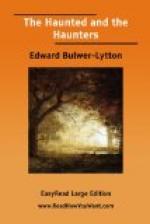To return to the room in question: I must observe that it is by no means remote or solitary, being surrounded on all sides by chambers that are constantly inhabited. It is accessible by a passage cut through a wall eight feet in thickness, and its dimensions are twenty-one by eighteen. One side of the wainscotting is covered with tapestry, the remainder is decorated with old family pictures, and some ancient pieces of embroidery, probably the handiwork of nuns. Over a press, which has doors of Venetian glass, is an ancient oaken figure, with a battle-axe in his hand, which was one of those formerly placed on the walls of the City of Carlisle, to represent guards. There used to be also an old-fashioned bed and some dark furniture in this room; but so many were the complaints of those who slept there, that I was induced to replace some of these articles of furniture by more modern ones, in the hope of removing a certain air of gloom, which I thought might have given rise to the unaccountable reports of apparitions and extraordinary noises which were constantly reaching us. But I regret to say, I did not succeed in banishing the nocturnal visitor, which still continues to disturb our friends.
I shall pass over numerous instances, and select one as being especially remarkable, from the circumstance of the apparition having been seen by a clergyman well known and highly respected in this county, who, not six weeks ago, repeated the circumstances to a company of twenty persons, amongst whom were some who had previously been entire disbelievers in such appearances.
The best way of giving you these particulars will be by subjoining an extract from my journal, entered at the time the event occurred.
Sept. 8, 1803.—Amongst other guests invited to Corby Castle came the Rev. Henry A., of Redburgh, and rector of Greystoke, with Mrs A., his wife, who was a Miss S., of Ulverstone. According to previous arrangements, they were to have remained with us some days; but their visit was cut short in a very unexpected manner. On the morning after their arrival we were all assembled at breakfast, when a chaise and four dashed up to the door in such haste that it knocked down part of the fence of my flower garden. Our curiosity was, of course, awakened to know who could be arriving at so early an hour; when, happening to turn my eyes towards Mr A., I observed that he appeared extremely agitated. “It is our carriage,” said he; “I am very sorry, but we must absolutely leave you this morning.”
We naturally felt and expressed considerable surprise, as well as regret, at this unexpected departure, representing that we had invited Colonel and Mrs S., some friends whom Mr A. particularly desired to meet, to dine with us on that day. Our expostulations, however, were vain; the breakfast was no sooner over than they departed, leaving us in consternation to conjecture what could possibly have occasioned so sudden an alteration in their arrangements. I really felt quite uneasy lest anything should have given them offence; and we reviewed all the occurrences of the preceding evening in order to discover, if offence there was, whence it had arisen. But our pains were vain; and after talking a great deal about it for some days, other circumstances banished the matter from our minds.




